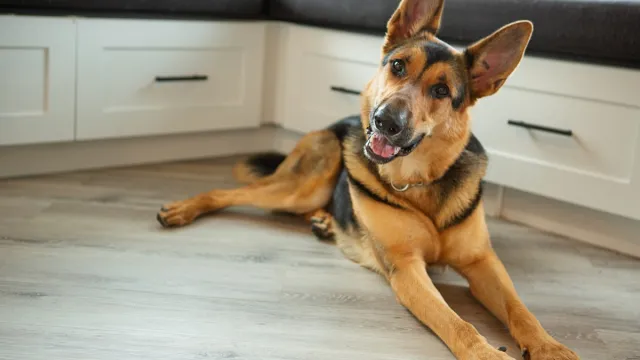Veterinary Workers Reveal the Dog Breeds They’re “Most Scared Of”

Let’s get one thing straight: All dogs are good. At least, that’s what those of us who love our canine friends want to believe. But people who have dogs, grew up with a family dog, or simply admire dogs from afar, all have our favorites. You shouldn’t be surprised that the same goes for veterinary workers, who aren’t shy about highlighting their personal picks. And some of their bias isn’t positive: There are some dog breeds that vets consider to be the scariest.
RELATED: 6 Dog Breeds Veterinarians Hate Having to Treat.
In a TikTok video with more than 13 million views, a South Carolina-based veterinarian named Taylor revealed which dog breeds she and her colleagues are the most frightened of. Many were not happy with their answers, with German Shepherd owners in particular up in arms.
The clip follows Taylor as she goes from room to room and interviews 11 of her colleagues to determine which dog breed the vets in their clinic don’t want to be around.
She asks, “What’s your least favorite dog breed or the one you’re most scared of?”
Though tiny in size, the Chihuahua—known for having a voracious bark and lots of energy—earned two votes. Others noted that the Boxer can be a difficult animal to groom and handle in a vet setting, while one person revealed that terrier breeds are their least favorite.
But the most popular answer among those who participated? The German Shepherd. Though a loyal and protective breed, six veterinary workers said they are most scared to handle a German Shepherd in a working environment.
Taylor’s followers were taken aback by the results, with many calling “for justice” for the noble breed. “When you expected to hear Pitbull but heard German Shepherds instead,” one commenter quipped.
“I told my German Shepherd to cover her ears during this video,” another joked.
A different person commented, “My German shepherd is a golden retriever bye.”
Regardless of these dog owners’ personal experiences, a number of current and former veterinary workers also chimed in and defended the German Shepherd votes. “10 years in the vet industry. I agree, German shepherd,” one vet commented.
“For all the GSD owners, as a vet tech … we understand they aren’t like that at home. They can be great dogs … but in clinic … terrifying,” another explained.
RELATED: I’m a Dog Trainer and I’d Never Own These 5 Breeds “Unless My Life Depended on It.”
In a separate video posted to TikTok, Taylor explains why the votes weren’t all that shocking on a professional level, as well as the reasoning behind many of her colleagues’ answers.
“German Shepherds are very smart dogs—these are a working breed that are supposed to have a job whether that be in the police force or whatever that may be,” she says.
Taylor goes on to explain that a German Shepherd is “a high-functioning dog that needs a lot of mental stimulation and exercise, and when people don’t know this about the breed and they are not educated, and they’re not responsible owners, this leads to a lot of stress and anxiety in the dog.”
According to the American Kennel Club (AKC), German Shepherds are often considered watchdogs and are protective by nature.
They’re also not open to strangers, and do not interact well with other dogs. For these reasons, Taylor says they can be difficult to handle in “the vet field or the grooming [field].”
Of course, that doesn’t mean veterinary workers don’t like German Shepherds outside of the office—and they can certainly sympathize with them.
“I don’t blame them. If I was a dog and you were sticking your finger up my you-know-what or you were giving me vaccines, poking me, prodding me and you’re a stranger, I’m probably going to bite you too,” Taylor says in her follow-up video. “I don’t judge them, no one in this field judges them, we don’t hate them, we just have to take proper precautions whether that be sedation or going slow.”
At the end of the day, Taylor and her colleagues would “rather love [German Shepherds] outside the vet doors.”
- Source: AKC: German Shepherd Dog